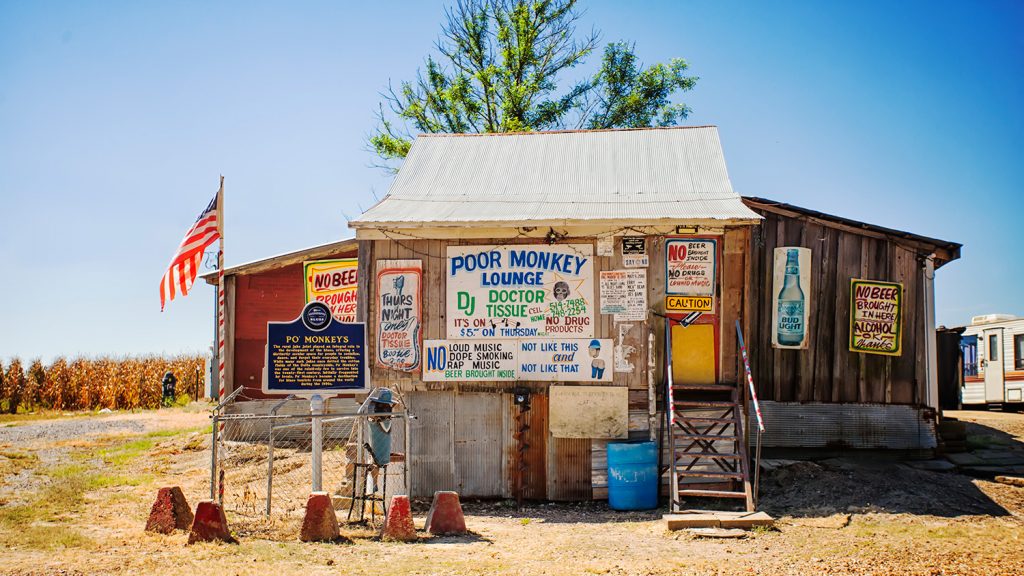PO' MONKEY'S

Po' Monkey's was a juke joint in unincorporated Bolivar County, Mississippi, United States, outside of Merigold. The juke joint was founded in the early 1960s and was one of the last rural juke joints in the Mississippi Delta. It ceased operating after the death of operator Willie "Po' Monkey" Seaberry in 2016.
The shack was originally sharecroppers' quarters. The building is made of tin and plywood, held together by nails, staples, and wires, loosely fashioned and made by Seaberry. The low ceilings of the joint were lined with Christmas lights, naked babydolls, street signs, wrapping paper, disco balls, and dozens of stuffed-animal monkeys. The outside of the joint features a sign reading: "No Loud Music, No Dope Smoking, No Rap Music." Po' Monkey's was operated by Seaberry until his death in 2016. He also had a life estate in the property itself, meaning that he owned it during his lifetime. Upon his death, ownership of the property (but not the building's contents) reverted to the Hiter family.
Po' Monkey's was an incubator for the Delta Blues scene. By the 1990s, Po' Monkey's was attracting a conglomeration of college students, migrating from Delta State University, located in Cleveland, MS, to juke joint pundits. In the 2000s, it housed in a raunchier crowd filled with dirty dancing, strippers, and $2 cans of beer.In 2009, the Mississippi Blues Commission placed a historic marker at the Po Monkey's Lounge in 2009 designating it as a site on the Mississippi Blues Trail for its contribution to the development of the blues (and being one of the few authentic juke joints then operating).
Seaberry was best known for his strangely coordinated outfits of wildly exotic pantsuits. He could be seen sneaking out of bar room, into a bedroom offset of the drinking quarters, only to reappear in a new pantsuit. Billy Nowell, the mayor of nearby Cleveland, MS at the time of Seaberry's death, called Seaberry a "positive influence" on Bolivar County.
Seaberry was found dead on July 14, 2016. Po' Monkey's ceased operating after Seaberry's death, and the contents of the building were sold at auction to Shonda Warner.
-------------------------------------------------------------------------------------------------------------------
Po 'Monkey's era un juke joint en el condado de Bolivar no incorporado , Mississippi , Estados Unidos, a las afueras de Merigold . La juke joint fue fundada a principios de los años sesenta y fue una de las últimas juke joint rurales en el Delta del Mississippi . Dejó de funcionar después de la muerte del operador Willie "Po 'Monkey" Seaberry en 2016.
La cabaña era originalmente el barrio de los aparceros. El edificio está hecho de estaño y madera contrachapada, unidos por clavos, grapas y alambres, moldeados y fabricados por Seaberry. Los techos bajos de la articulación estaban llenos de luces navideñas, muñecas desnudas, letreros de calles, papel de regalo, bolas de discoteca y docenas de monos de peluche. El exterior de la articulación presenta un letrero que dice: " No Loud Music, No Dope Smoking, No Rap Music". Po 'Monkey's fue operado por Seaberry hasta su muerte en 2016. También tenía una propiedad vitalicia en la propiedad en sí misma, lo que significa que la poseyó durante su vida. Tras su muerte, la propiedad de la propiedad (pero no el contenido del edificio) volvió a la familia Hiter.
Po 'Monkey's fue una incubadora de la escena Delta Blues. En la década de 1990, Po 'Monkey's estaba atrayendo a un conglomerado de estudiantes universitarios, que migraban desde la Delta State University , ubicada en Cleveland, MS, para robar a los expertos conjuntos. En la década de 2000, se encontraba en una multitud más obscena llena de bailes sucios, strippers y latas de cerveza de $ 2. En 2009, la Comisión de Blues de Mississippi colocó un marcador histórico en Po Monkey's Lounge en 2009 designándolo como un sitio en el Mississippi Blues Trail por su contribución al desarrollo del blues (y siendo uno de los pocos articulaciones juke auténticas y luego en funcionamiento).
Seaberry era mejor conocido por sus atuendos extrañamente coordinados de trajes de pantalones exóticos. Se lo podía ver escabullirse de la sala del bar, hacia el dormitorio de los cuartos de bebidas, solo para reaparecer en un traje de pantalón nuevo. Billy Nowell, el alcalde de la cercana Cleveland, MS en el momento de la muerte de Seaberry, calificó a Seaberry de "influencia positiva" en el condado de Bolívar . Seaberry fue encontrado muerto el 14 de julio de 2016. Po 'Monkey dejó de funcionar después de la muerte de Seaberry, y el contenido del edificio se vendió en una subasta a Shonda Warner.

Si os interesa el tema podéis encontrar mas info en este libro :
Outside of Merigold, Mississippi, off an unmarked dirt road, stands Po' Monkey's, perhaps the most famous house in Mississippi and the last rural juke joint in the state, now closed to the public. Before the death of the lounge's owner, Willie Seaberry, in 2016, it was a mandatory stop on the constant blues pilgrimage that flows through the Delta. Seaberry ran Po' Monkey's Lounge for more than fifty years, opening his juke joint in the 1960s. A hand-built tenant home located on the plantation where Seaberry worked, Po' Monkey's was a place to listen to music and drink beer-a place to relax where everyone was welcomed by Seaberry's infectious charm. In Po' Monkey's: Portrait of a Juke Joint, photographer Will Jacks captures the juke joint he spent a decade patronizing. The more than seventy black-and-white photographs featured in this volume reflect ten years of weekly visits to the lounge as a regular-a journal of Jacks's encounters with other customers, tourists, and Willie Seaberry himself. An essay by award-winning writer Boyce Upholt on the cultural significance of the lounge accompanies the images. This volume explores the difficulties of preservation, historical context, community relations, and cultural tourism. Now that Seaberry is gone, the uncertainty of the future of his juke joint highlights the need for a historical record.




Comments